- Home
- Brian Jacques
High Rhulain Page 2
High Rhulain Read online
Page 2
Lycian sipped her tea approvingly, nodding towards the front steps and main oaken door. “No storm could bother our home, eh, Burbee?”
Frowning, the molemum squinted over the rim of her mug at the Abbey grounds. “Hurr, that’s as may be, young marm, but lookit ee h’orchard. Trees blowed thisaway an’ that, fruits’n’berries be’n knocked offen ee boughs. Gurt pesky stormgale!”
Lycian patted her friend’s paw, smiling. “Oh come on, old grumblechops, that’s what usually happens in bad weather. Nothing our Redwallers can’t put to rights. Drink up now, here comes our refill.”
Besides being a Foremole (which is a lofty position among his fellow creatures), Grudd Longtunnel was also the Head Abbey Gardener. A nephew of molemum Burbee, he was good-natured, cheerful and honest as the day is long. Balancing a tray on one powerful paw, he clambered up the steps to the walltop, tugging his snout respectfully to the Abbess and his aunt.
“Gudd mornen to ee, marms, an’ a roight purty one et bee’s, too. Oi bringed ee ’ot scones an’ h’extra tea. Boi okey, you’m surrtingly can sup summ tea in ee course of a day. Moi ole tongue’d float away if’n I drinked that much tea!”
Burbee chuckled. “Gurt h’imperdent young lump, lessen thoi cheek an’ pour us’n’s summ o’ that brew.”
Grudd placed the plate of fresh scones, spread with meadowcream and clover honey, between them. Whipping the cosy from a sizeable teapot, he topped up both their mugs. “Shudd see wot ee storm do’d to moi veggibles. Flartenned ee lettuces, snapped off’n celery an’ strewed termatoes every whichway. Even rooted up moi young radishers. Burr!”
Lycian blew on her tea to cool it. “Your aunt Burbee was just remarking on the storm damage in the orchard. Is it very bad, Grudd?”
The Foremole’s face creased deeply in a reassuring smile. “Doan’t ee frett, h’Abbess marm. Oi gotten moi molecrew a-workin’ daown thurr, an’ all ee Redwallers lendin’ a paw. Just bee’s two more willin’ beasts a-needed.”
Lycian shot him a look of mock severity. “We’ll be down just as soon as we’ve finished tea, my good mole, and not a moment sooner. Carry on with your duties!”
Grudd caught the twinkle in her eyes. He bowed low, tugging his snout in a servile manner. “Vurry gudd, marm, as ee says, marm, you’m take yurr own gudd toime, marm. Oi’ll look for’ard to ee visit with pleshure. ’Twill be a gurt honner furr uz ’umble molebeasts!”
Burbee shook with mirth at the antics of her nephew. “Ho bee off’n with ee, you’m gurt foozikil!”
Down in the orchard, Banjon Wildlough, the otter Skipper, was organizing the workers. Banjon was not a big creature, as otters go, but he had an undoubted air of command about him. Everybeast obeyed his orders, all working together for the common good—except the Dibbuns, of course. (These were the little ones; Abbeybabes were always referred to as “Dibbuns.”) The otter Skipper tried to keep his patience with their rowdy manner, which, after all, was the innocence of playful infants.
“No no, Gropp! Ye can’t eat those apples, they ain’t ripe yet. You’ll get tummyache, I’m warnin’ ye. Taggle! Stop chuckin’ them hazelnuts around. Grumby! Come down out o’ that tree. Irgle, Ralg, where are ye off to with that barrow?”
Banjon turned despairingly to his friend, Brink Greyspoke, the big, fat hedgehog who was Redwall’s Cellarhog. “I gives up! Can’t you do anythin’ with the liddle rogues?”
Brink was a jolly creature and well-liked by the Dibbuns. He tipped Skipper a wink. “I’ll soon get ’em organised, leave it t’me, Skip.”
Brink began by appealing to what Dibbuns loved most: their stomachs. “Lissen now, ye big workbeasts. I ’eard that Friar Bibble ’as got lots o’ candied chestnuts to reward willin’ bodies with. So ’ere’s the plan. See all this hard sour fruit wot’s fallen? Well, that’ll go for preservin’ an’ picklin’. All those green nuts, too—they’ll be used in the cheesemakin’. Toss the lot into yon barrow, an’ we’ll take ’em to the kitchens, that’ll please the Friar greatly. Come on now, let’s see those big muscles bulgin’!”
Squeaking with delight, the Dibbuns rushed to obey Brink.
Banjon spotted some of the older ones about to leave the orchard. They were led by his daughter, Tiria. He called to the ottermaid, “Ahoy, me gel, where d’ye think yore off to?”
Tiria Wildlough stood a head taller than her father. She was a big, strong otter, with not a smidgeon of spare flesh on her sinewy frame. She shunned the typical dress of a maiden, wearing only a cutdown smock, to allow her free movement. This was belted around her waist by her favourite weapon, a sling, which she had named Wuppit. Despite Tiria’s young age, her skill with the sling was readily acknowledged by everybeast within Redwall.
She waved cheerily to her father, whom she always addressed as Skip. “We’re going to help the molecrew with their compost heap, Skip. Was there anything else you wanted us for?”
Banjon paused a moment, as if making up his mind. “Foremole Grudd told me he’d like a load of posts an’ staves. He’s thinkin’ of buildin’ fences to act as a windbreak from any more wild weather we might get. It’ll cut down on damage to his fruit an’ veggibles. D’ye follow me?”
One of Tiria’s chums, a young squirrel called Girry, shook his head doubtfully. “No wood like that growing in our Abbey grounds, Skip. . . . ”
His friend, a young mole named Tribsy, interrupted. “Nay zurr, h’only in ee Mossflower wuddlands will ee foind such timber—yew, ash an’ mebbe summ sturdy willow. They’m all a-growen out thurr.”
Banjon nodded. “Aye, Foremole asked me to go for it, but I got me paws full with wot’s to be done here. Tiria, me gel, I was thinkin’, would you like the job of woodcuttin’?”
The ottermaid’s eyes lit up like stars. “What, you mean go out into Mossflower? On our very own, me an’ Tribsy, an’ Girry, an’ Brinty? Of course we can!”
Her father’s offer meant that they were grown-up and capable enough to be let out without supervision, alone into the vast thicknesses of the Mossflower Woodlands.
Banjon eyed his daughter with that no-nonsense look he had cultivated. “Right, so be it. Tiria, I’m holdin’ you responsible, yore in charge. No larkin’ about or strayin’ off too far!”
Tiria strove hard to keep from bubbling over with excitement. “Count on me, Skip. Straight out, get the wood and right back here to the Abbey. Right, come on, mates, let’s get going!”
Skipper coughed. Turning aside, he stifled a smile. “Not so fast, crew. Take yore time, the wood won’t run away. Oh, an’ ye’d best take a cart along, an’ two of Brink Cellarhog’s axes. See Friar Bibble, he’ll give ye vittles an’ drink for a break at noon. Now remember, Foremole only wants sound wood—good strong branches, straight an’ well-trimmed. Right, off ye go!”
Skipper Banjon watched as they strode off together, raucously singing an old work song.
“Oh the seasons turn again again,
as Redwall beasts do work work work,
through sun an’ wind an’ rain rain rain,
we never never shirk shirk shirk!
To table then each eventide,
as sun is setting down down down,
a-feasting drinking singing,
with ne’er a tear or frown frown frown!
We all! We all! Are happy at Redwall!
Our Abbey! Our Abbey!
We’re proud to serve Redwall one and all, one and all!”
Brink Greyspoke stood up from fruit gathering. Rubbing his back, he nodded at the departing group. “First outin’ on their own, eh? You sure yore a-doin’ the right thing, Skip?”
Banjon nodded. “They’ll be right as rain with my Tiria in charge. Ye can’t keep young ’uns penned atwixt Abbey walls forever. Do they know where ye keep yore axes in the cellars?”
Brink stroked his chinspikes. “Aye, they know alright, Skip. I just ’ope they bring my new ’un back in one piece. I fitted a beech haft on it only two days back, ’tis a good axe, that’un. . . . ”
He was about to expand on the subject of axes when he spotted the Dibbuns marching off in a determined manner. “Whoa there, liddle mates! Where are ye bound?”
Grumby the hogbabe pointed toward the main gate. “Ho, us is goin’ to ’elp Miz Tirrier to choppa wood. Don’t not worry, Skip, we keep a h’eye on ’em for youse!”
Brink gathered the little ones up and placed them in the big wheelbarrow amid the windfall fruits. “Yore far too young t’be rovin’ about woodlands. I’ll take ye up t’the kitchens an’ tell Friar Bibble to feed ye all well for yore hard work. Will ye lend a paw ’ere, Skip?”
Banjon took one of the barrow handles. “I certainly will, matey. Friar Bibble might feed me, too. A liddle bird told me that he’s bakin’ sugarplum pudden today.”
The Dibbuns roared with delight. “Sugarplum pudden! Whooooraaaayyy!”
Brink turned his eyes skyward, murmuring to Skipper, “I’opes to goodness he is, ’cos if’n he ain’t, we’ll ’ave to run for our lives from those liddle ’uns!”
2
In the woodlands south of Redwall Abbey, other young creatures were abroad that day: a small gang of water rats, eight in all, headed by one Groffgut. Leaving the larger vermin bands, they had wandered up country, seeking any opportunity to plunder, kill or cause terror. This was done in the hope of establishing themselves as a feared vermin band. Thus far they had made patchy progress, but Groffgut’s confidence was growing daily.
Warm noontide sun slanted through the trees onto a quiet streambank. Some of the rats lay about by the shallows, fishing the limpid waters, whilst others foraged for nests with eggs in them. Groffgut disdained such menial tasks, letting the others do all the chores. By virtue of his size, strength and quick temper, he was the chief. Stretched flat out, he gazed over the bump of his paunchy gut, idly watching the blue-grey campfire smoke blending amid sun shafts.
One of his minions, Hangpaw, limped up from the shallows, displaying a small perch dangling from a line. “Yeherr, Chief, lookit, I gorra fish!”
Groffgut was not impressed. “Yarr, s’only a likkle ’un. Stick it onna fire, an’ go an’ catcher some big ’uns.”
An excited whoop rang out from farther up the bank. “Yaggoo! Cumm an’ see dis, mates, I gorra h’eagle!”
Groffgut heaved his bulk up irately. “Wot’s dat Frogeye shoutin’ about now?”
Plugtail, another of the gang, came scurrying up. “Chief, Chief, Frogeye’s catchered a h’eagle!”
Groffgut shoved him to one side. The rest followed him as he went to investigate, grumbling all the way. “Huh, shupid! Rats don’t catcher h’eagles, don’t dat ijjit know? It’s h’eagles wot catchers rats!”
None of the gang had ever seen an eagle before, but there was no doubt that Frogeye had captured a big, fierce bird. It looked a lot like they imagined an eagle should look. Frogeye’s lazy eye, the one that normally remained lidded over, was blinking up and down, exposing the milky-hued pupil, as the rat danced around, prodding and tripping his find with a crude, homemade spear. The wounded and exhausted bird stumbled forward, desperately trying to get at the lifesustaining streamwater.
Frogeye slammed his spearbutt into its body, toppling it backward, tail over crest. He laughed callously. “Yeeheehee! See, I told ya, didden’t I? I catched a real live h’eagle all by meself!”
Groffgut drew his sword, which was in reality a broken scythe blade with a rope handle. Approaching the big bird, he stood on one of its half-spread wings, pinning the other with his blade as he inspected it. Had the bird not been injured or fatigued, any rat would have rushed for cover at the sight of it. Groffgut saw clearly that it was unable to resist. The bird’s savage golden eyes were clouded and flickering shut, a stream of dried blood apparently having sealed its lethally hooked beak. The magnificent dark brown and white plumage stuck out willy-nilly after being battered for leagues across stormbound seas.
Groffgut gave the gang his verdict. “Aye, it’s a h’eagle, shore enuff!”
Nobeast took the trouble to argue, though Hangpaw, a thin rat with a withered limb, ventured to enquire, “Wot’s we s’posed ter do wid h’eagles?”
Threetooth, who lacked all but three fangs, cackled. “Yer eats ’em, I think.”
His companion, Rashback, so named because of an unsightly mange, scratched vigourously at his scraggy tail. “I didden know ye could eat h’eagles!”
Groffgut eyed him contemptuously. “Ye can eat anybeast once it’s dead, turnep’ead!”
Frogeye became huffy at not being consulted. “Hoi! Dis is my h’eagle, Icatchered it. S’pose I duzzen’t wanner eat it, eh?”
Groffgut pointed at Frogeye with his sword. “Tern around willyer, mate.”
Frogeye turned obediently, and Groffgut dealt him an enormous kick to the bottom, which knocked him flat. The breath whooshed out of Frogeye as Groffgut stamped a footpaw down on his back, sneering, “I’m the chief round ’ere! Who asked yew, malletnose? Plug, git yore rope round dis h’eagle’s claws, lash ’im tight.”
Plugtail flung his rope around the big bird’s legs and noosed them securely. The bird could only flap its wings feebly in protest.
Groffgut issued his orders to the gang. “We’ll eat the h’eagle later. Let’s ’ave a bit o’ fun wid it first. T’ain’t every day yer gits a h’eagle ter play wid. Tow it back ter camp, mates!”
The wood-gathering expedition had been a success. Tiria and her three friends had worked diligently, filling the cart with a selection of long branches and straight, thick limbs. It was mainly good yew staves, some pieces of ash and a selection of lesser but useful bits of willow and birch. The four companions were following the course of a stream, which they knew flowed close to the south path at one point. Once they reached the path, Redwall would be within easy walking distance. Tiria estimated they would reach the Abbey by early evening.
Enjoying the freedom of the outdoors, and being in no great hurry, they opted to take a break for an afternoon snack on the streambank. Girry unpacked the last of their food, whilst Tiria checked the ropes which bound the cargo of wood to the cart. Brinty and Tribsy skimmed flat pebbles over the slow-flowing stream. The ottermaid felt quietly proud of herself; she had completed her task without any untoward incident. Cooling her footpaws in the shallows, she watched the noon shadows start to lengthen over the tranquil waters. Two green- and black-banded dragonflies patrolled the far reed margin, their wings iridescent in the sunlight. Bees droned drowsily around some water crowfoot blossoms, and birdsong echoed amid the trees.
Tribsy left off skimming and sat down to eat. “Froo’ corjul an’ hunny sangwiches, moi fayverrit!”
Tiria smiled. “Good old Friar Bibble, he knows how to look after hungry workers, eh Tribsy?”
The young mole smiled from ear to ear. “Hurr, an’ us’ll be back at ee Red’all in gudd toime furr supper. Oi dearly loikes a noice supper, so oi doo’s!”
Brinty took a long swig of the fruit cordial. “Don’t you ever think of anything but eating, old famine face?”
Tribsy patted his stomach. “Whut’s to think abowt, maister? Oi bee’s nought but ee pore choild needin’ vittles aplenty to grow.”
Brinty watched the young mole demolish a sandwich in two bites. “You’re growing sideways instead of upwards.”
Girry gestured his friends to be quiet as his ears stood up straight. “Ssshh! Listen, did you hear that?”
They listened for a moment, then Tiria shrugged. “Hear what?”
Girry pointed upstream. “Over that way, sounded like somebeasts enjoying themselves, laughing and shouting.”
Tribsy wrinkled his snout. “Oi doan’t yurrs nuthin’. You’m squirrels can yurr better’n uz moles, burr aye.”
Brinty shook his head. “I don’t hear anything, either.”
Girry began climbing a nearby elm. “Well, I can hear it, there’s something going on up yonder. You three stay here, I’ll go and take a peep.”
Tiria cautioned her friend, “Stay in the
treetops, Girry. Don’t go getting yourself into any trouble. I don’t want to face my dad back at the Abbey and have to tell him something happened to you!”
The agile young squirrel threw her a curt salute. “Yes marm, don’t fret marm, I’ll be fine marm!”
The ottermaid watched him ascend into the upper foliage. “Well, just be careful, and less of the marm, please! I’m only one season older than you, cheekybrush!”
Tribsy commandeered another sandwich. “Oi’ll just finish off ee vittles whoile us’ns bee’s waitin’. Ho joy, this ’un’s gotten cheese on it, moi fayverite!”
Brinty looked at his molefriend in amazement. “Is there any sandwich that isn’t your favourite?”
Tribsy shook his head solemnly. “Oi b’aint found one as yet, zurr.”
After a while they went back to skimming stones. Tiria was by far the best skimmer, making one flat chip of bankrock jump nine times as it bounced over the water. It was rather pleasant passing an afternoon in this fashion, the ottermaid thought. She began to wonder what the fuss and stern warnings from her father had been all about.
Just then, Girry dropped down out of the elm in a rush of leaves and twig ends. The young squirrel, breathless with indignation and urgency, gabbled out, “They’ve got a big bird hanging upside down from a tree and they’re lighting a fire under it, hitting it with spearpoles. We’ve got to stop them, Tiria, oh, the poor bird!”
Grabbing her friend, the ottermaid shook him soundly. “Make sense, Girry! What big bird, where, and who’s hitting it? Now take a deep breath and start again, properly!”

 The Long Patrol
The Long Patrol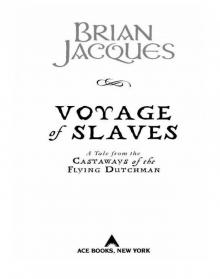 Voyage of Slaves
Voyage of Slaves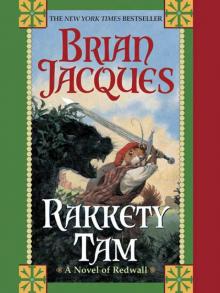 Rakkety Tam
Rakkety Tam Pearls of Lutra
Pearls of Lutra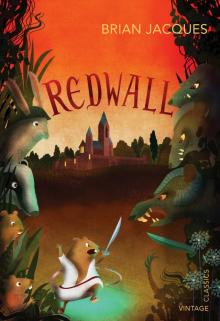 Redwall
Redwall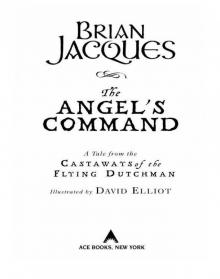 The Angel's Command
The Angel's Command Mossflower (Redwall)
Mossflower (Redwall) Marlfox (Redwall)
Marlfox (Redwall)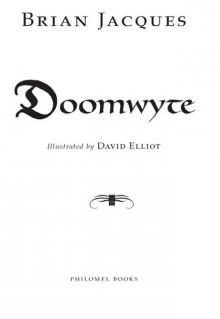 Doomwyte
Doomwyte Martin The Warrior (Redwall)
Martin The Warrior (Redwall)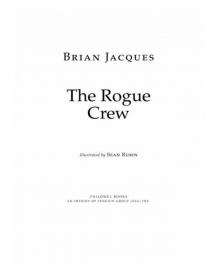 The Rogue Crew
The Rogue Crew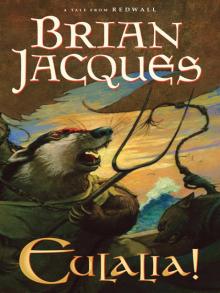 Eulalia!
Eulalia!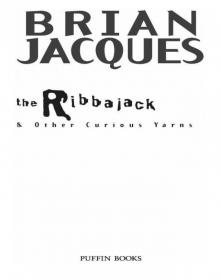 The Ribbajack: And Other Haunting Tales
The Ribbajack: And Other Haunting Tales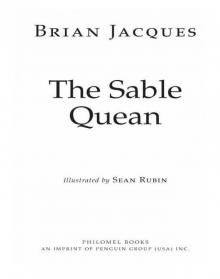 The Sable Quean
The Sable Quean The Bellmaker
The Bellmaker Lord Brocktree
Lord Brocktree The Legend of Luke
The Legend of Luke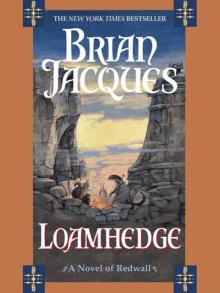 Loamhedge
Loamhedge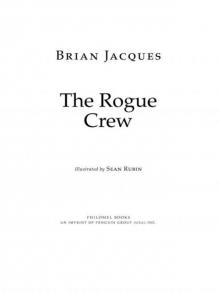 The Rogue Crew: A Tale of Redwall
The Rogue Crew: A Tale of Redwall![[Redwall 18] - High Rhulain Read online](http://i1.bookreadfree.com/i/03/23/redwall_18_-_high_rhulain_preview.jpg) [Redwall 18] - High Rhulain
[Redwall 18] - High Rhulain The Pearls of Lutra
The Pearls of Lutra Salamandastron (Redwall)
Salamandastron (Redwall)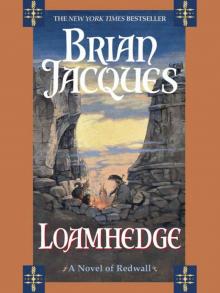 Loamhedge: A Novel of Redwall
Loamhedge: A Novel of Redwall Outcast Of Redwall
Outcast Of Redwall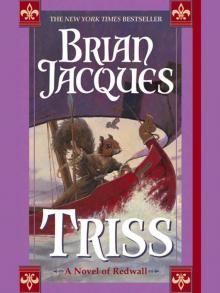 Triss: A Novel of Redwall
Triss: A Novel of Redwall The Taggerung (Redwall)
The Taggerung (Redwall)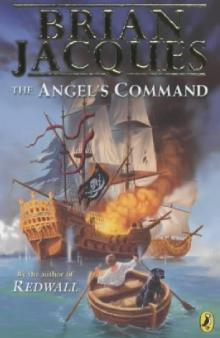 The Angel's Command fd-2
The Angel's Command fd-2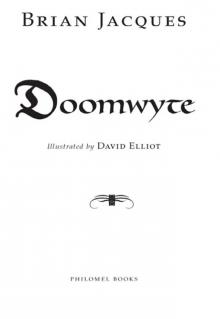 Doomwyte (Redwall)
Doomwyte (Redwall)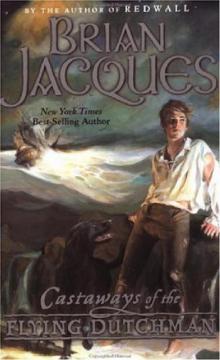 Castaways of the Flying Dutchman fd-1
Castaways of the Flying Dutchman fd-1![[Flying Dutchman 01] - Castaways of the Flying Dutchman Read online](http://i1.bookreadfree.com/i1/04/07/flying_dutchman_01_-_castaways_of_the_flying_dutchman_preview.jpg) [Flying Dutchman 01] - Castaways of the Flying Dutchman
[Flying Dutchman 01] - Castaways of the Flying Dutchman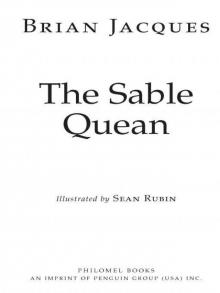 The Sable Quean (Redwall)
The Sable Quean (Redwall) The Bellmaker (Redwall)
The Bellmaker (Redwall) Mariel Of Redwall
Mariel Of Redwall Mattimeo (Redwall)
Mattimeo (Redwall)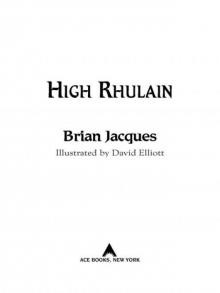 High Rhulain (Redwall)
High Rhulain (Redwall)